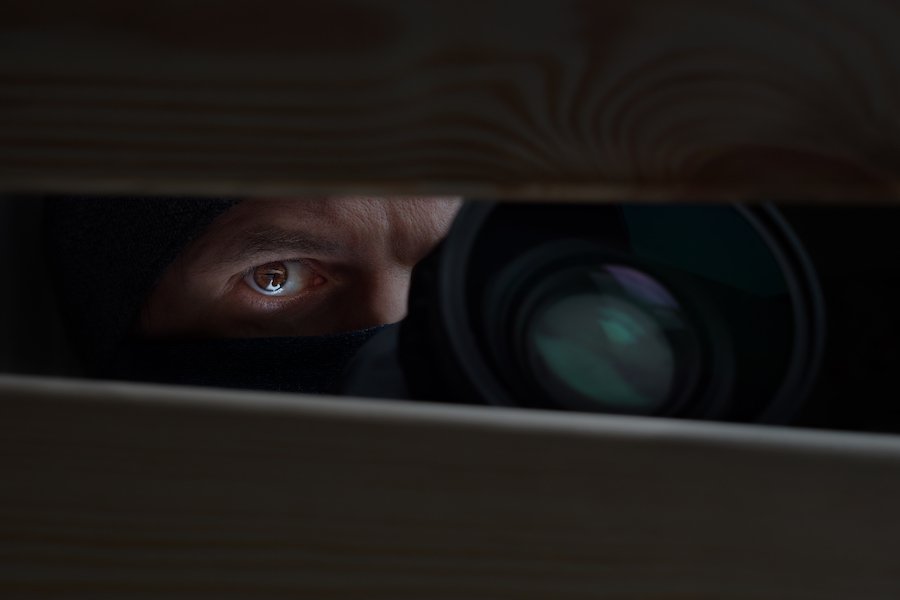Under Colorado CRS § 18-7-801, taking pictures of a person’s intimate body parts without consent is considered criminal invasion of privacy and can be prosecuted as a class 2 misdemeanor.
The penalties include
- up to 120 days in jail
- and/or a fine of up to $750.
A conviction may also require registration as a sex offender.
The language of Section 18-7-801 states that:
(1) A person who knowingly observes or takes a photograph of another person’s intimate parts, as defined in section 18-3-401 (2), without that person’s consent, in a situation where the person observed or photographed has a reasonable expectation of privacy, commits criminal invasion of privacy.
In this article, our Denver Colorado criminal defense lawyers will address:
- 1. What is criminal invasion of privacy?
- 2. What types of photographs are included?
- 3. What are the penalties for invasion of privacy?
- 4. Do I have to register as a sex offender for invasion of privacy?
- 5. What is civil invasion of privacy in Colorado?
- 6. Related Offenses

In Colorado, taking pictures of a person’s intimate body parts without their consent is criminal invasion of privacy.
1. What is criminal invasion of privacy?
A person who knowingly observes or takes a photograph of another person’s intimate parts without that person’s consent is criminal invasion of privacy. This involves situations where the person who is observed or photographed has a reasonable expectation of privacy. 1
Intimate parts include the external
- genitalia,
- perineum,
- anus,
- buttocks,
- pubic region, or
- breasts of any person.2
Invasion of privacy includes observation or photographs. A person can be charged with criminal invasion of privacy if they set up a camera to observe a person at a later time. This includes
- hiding a camera in a dressing room that provides a live feed, or
- recording images to be collected at a later time.
If the camera is discovered, the individual may be arrested and charged with invasion of privacy even if they never got a chance to look at the photos.
Invasion of privacy requires the person to be observed or photographed in an area where they have an expectation of privacy. Observing a person’s intimate parts may not be considered an invasion of privacy when it occurs in a place such as
- a known nude beach or
- inside a strip club.
2. What types of photographs are prohibited?
Taking photographs of a person’s intimate parts without consent is not limited to traditional photos.3 Under C.R.S. 18-7-801, photographs include:
- Photographs
- Motion Pictures
- Videotapes
- Live Feeds
- Prints
- Negatives
- Slides; or
- Other reproduced visual material.
3. What are the penalties for invasion of privacy?
Invasion of privacy is a class 2 misdemeanor in Colorado. The penalties for a conviction for invasion of privacy include
- up to 120 days in jail and/or
- up to $750 in fines.4
In some cases, invasion of privacy may be considered a crime of moral turpitude or a crime against the public good. Crimes of moral turpitude have immigration consequences. If you are applying for citizenship, a conviction for invasion of privacy may be a deportable offense.

Violating CRS 18-7-801 is a class 2 misdemeanor.
4. Do I have to register as a sex offender for invasion of privacy?
A conviction for invasion of privacy may require registration as a sex offender if it was done for sexual gratification. Invasion of privacy for sexual gratification is a separate criminal offense under C.R.S. 18-3-405.6.
- Invasion of privacy for sexual gratification is a class 1 misdemeanor;
- however, it is a class 6 felony if the defendant has a prior conviction or photography was of a person under the age of 15.5
Invasion of privacy for sexual gratification is an extraordinary risk crime, with increased penalties. It also results in designation as a sex offender.6 As a sex offender, your name will be entered into the Colorado Bureau of Investigation’s sex offender registry.
A sex offender has to register with the local chief of police or county sheriff in any jurisdiction where they reside. Registration includes providing the sex offender’s
- name,
- date of birth,
- address,
- place of employment,
- fingerprints,
- a photograph,
- email addresses, and
- instant messaging or chat room identities.
The sex offender will also have to re-register
- every year within 5 days of their birthday or
- re-register if they change address or begin working at an institution of higher education.
Failure to register as a sex offender or knowingly providing false information is a criminal offense, punishable by prison and a possible fine.
- Failure to register as a sex offender for misdemeanor criminal invasion of privacy is a class 1 misdemeanor.
- Failure to register for felony criminal invasion of privacy is a class 6 felony.7
5. What is civil invasion of privacy in Colorado?
Civil invasion of privacy is a “cause of action” for which victims can sue. People held liable for civil invasion of privacy are typically ordered to pay money damages to the victim. The district attorney is not involved because civil invasion of privacy is not criminal. Moreover, civil courts cannot impose jail time.
Colorado recognizes two separate civil invasion of privacy causes of action:
- Disclosure, which is unreasonable publicizing of another person’s private life without his/her consent; and
- Appropriation, which is using another person’s name or likeness without permission.
Colorado’s civil invasion of privacy claims bear little resemblance to criminal invasion of privacy. The civil claims do not necessarily require that the defendant take intimate pictures without the subject’s consent.
In order to win a civil invasion of privacy lawsuit, the plaintiff (victim) would need to prove that the defendant is liable by a preponderance of the evidence. This is a much lower standard than in criminal court, where prosecutors must prove guilt beyond a reasonable doubt.
Potential defenses to civil invasion of privacy claims are that:
- the defendant was protected by the First Amendment,
- the plaintiff did not have a reasonable expectation of privacy, and/or
- the defendant was reporting news or giving a commentary.8
6. Related Offenses
Invasion of Privacy for Sexual Gratification C.R.S. 18-3-405.6
Taking intimate photos of people without their consent for sexual gratification can be a misdemeanor or felony, depending on the defendant’s criminal history and the age of the victim. It is also an extraordinary risk crime. A conviction for invasion of privacy for sexual gratification may result in up to 2 years in prison, a fine of up to $100,000, and classification as a sex offender.
Indecent Exposure C.R.S. 18-7-302
Exposing your genitals to another person is considered indecent exposure and a violation of Colorado law. Masturbating in public is also considered indecent exposure. Indecent exposure is a class 1 misdemeanor in Colorado and can result in up to 364 days in jail and/or a $1,000 fine. A conviction for indecent exposure may also require you to register as a sex offender.
Public Indecency C.R.S. 18-7-302
Exposing your intimate body parts, having sex in public, or exposing your genitals to offend another person is a violation of Colorado’s public indecency statute. Public indecency is a petty offense. A conviction for public indecency could result in up to 10 days jail and a fine of up to $300.
Lewd Conduct C.R.S. 18-7-301
Lewd conduct involves exposing your genitals, having sex in public or masturbating in public, or fondling another person is a violation of Colorado’s public indecency and indecent exposure laws. The penalties for lewd conduct depend on whether the conduct is charged as public indecency or indecent exposure.
Criminal Trespass C.R.S. 18-4-502
You commit Colorado criminal trespass when you unlawfully enter or remain on someone else’s property. Trespass can be in the first, second or third degree, depending on the type of property involved, and your reason for entering or remaining on the property. Penalties for criminal trespass in Colorado range from as little as a fine and probation to as much as three years in prison and a $100,000 fine.
Legal References
- C.R.S. 18-7-801(1)
- C.R.S. 18-3-401(2)
- C.R.S. 18-7-801(3)
- C.R.S. 18-7-801(2). Prior to March 1, 2022, class 2 misdemeanors carried 3 to 12 months in jail and a fine of up to $1,000. SB21-271.
- C.R.S. 18-3-405.6(2)
- C.R.S. 16-22-102(9)(aa)
- C.R.S. 18-3-412.5
- Colorado Civil Jury Instructions 28:4 & 28:5; see also Robert C. Ozer, P.C. v. Borquez (Colo. 1997) 940 P.2d 371; People v. Home Ins. Co. (Colo. 1979) 197 Colo. 260, 591 P.2d 1036. Note that Colorado does not recognize the torts of “intrusion” (unreasonable intrusion upon the seclusion of another) or “false light” (publicity that unreasonably shows another person in public in an untrue light).
